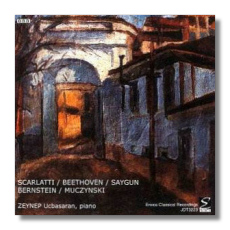
The Internet's Premier Classical Music Source
Related Links
- Latest Reviews
- More Reviews
-
By Composer
-
Collections
DVD & Blu-ray
Books
Concert Reviews
Articles/Interviews
Software
Audio
Search Amazon
Recommended Links
Site News
 CD Review
CD Review
Zeynep Ucbasaran Plays

- Domenico Scarlatti:
- Sonata in D minor, K1
- Sonata in D minor, K9
- Sonata in C minor, K11
- Sonata in G Major, K146
- Ludwig van Beethoven: 7 Bagatelles, Op. 33
- Ahmet Adnan Saygun:
- Inci's Book, Op. 10
- Preludes on Aksak Rhythms, Op. 45 #1, 4, 7, 10, 11
- Leonard Bernstein: Touches (Chorale, 8 Variations, Coda)
- Robert Muczynski: 6 Preludes, Op. 6
Zeynep Ucbasaran, piano
Eroica Classical Recordings JDT3223 67m DDD
Apart from Domenico Scarlatti's Sonatas, and Beethoven's Bagatelles all the remaining repertoire is for me, uncharted territory, as is the soloist and the label. Eroica Classical recordings is an American based company whose objective is to launch new music and new artists and with this issue they have certainly hit both nails on the head.
Zeynep Ucbasaran, who hails from Turkey, is certainly not a household name, but she is definitely a star of the future. This recital amply displays her already amazing ability to capture the different styles and moods of the baroque, romantic and modern eras. Her Scarlatti and Beethoven are wonderful examples of controlled playing, yet the impression I got was that of a musician revelling in the simple beauties of these straightforward pieces; I dare say she really makes the music float through thin air.
With the Saygun, Bernstein and Muscynzki pieces, we are on a totally different planet. Ahmet Adman Saygun also hails from Turkey and is today regarded as one of the country's foremost composers. Born in 1907, his vast output includes 5 symphonies, 5 operas, 2 ballets and concertos for piano (two), violin, viola and cello, not to mention many other works in different genres. "Ina's Book" (1934) is an early piece split up in 7 short episodes depicting the imaginary world of a little girl. The Prelude Selections are from the 12 Preludes on Aksak Rhythms Op. 45 (1967). This work makes easy listening but the Preludes are a stark contrast and demand full concentration from both listener and performer due to their very unusual rhythms and textures.
The American composers' Leonard Bernstein (1918-1990) and Robert Muczynski (b. 1929) complete the disc. Bernstein's 'Touches' was written in 1980 and makes heavy use of the piano's kaleidoscopic possibilities and of a variety of rhythmic changes and abrupt dynamic extremes. Robert Muczynski, a contemporary American musician born in Chicago of Polish-Slovak parents, has made a name as a fine piano composer. The 6 Preludes, Op. 6 are an early work (1954), full of imaginative sounds and dynamic shifts. In spite of its brevity, it still remains a fine specimen of how a group of fragmentary ideas can be moulded into a unified whole.
Ucbasaran is not daunted by the formidable demands of these pieces, on the contrary, she grabs the opportunity with 'both hands' to project and promote her amazing natural skills and virtuosic instincts. A mixed bag then, but for those who want to explore some rare piano repertoire, they should not hesitate to take the dip.
Copyright © 2005, Gerald Fenech




















